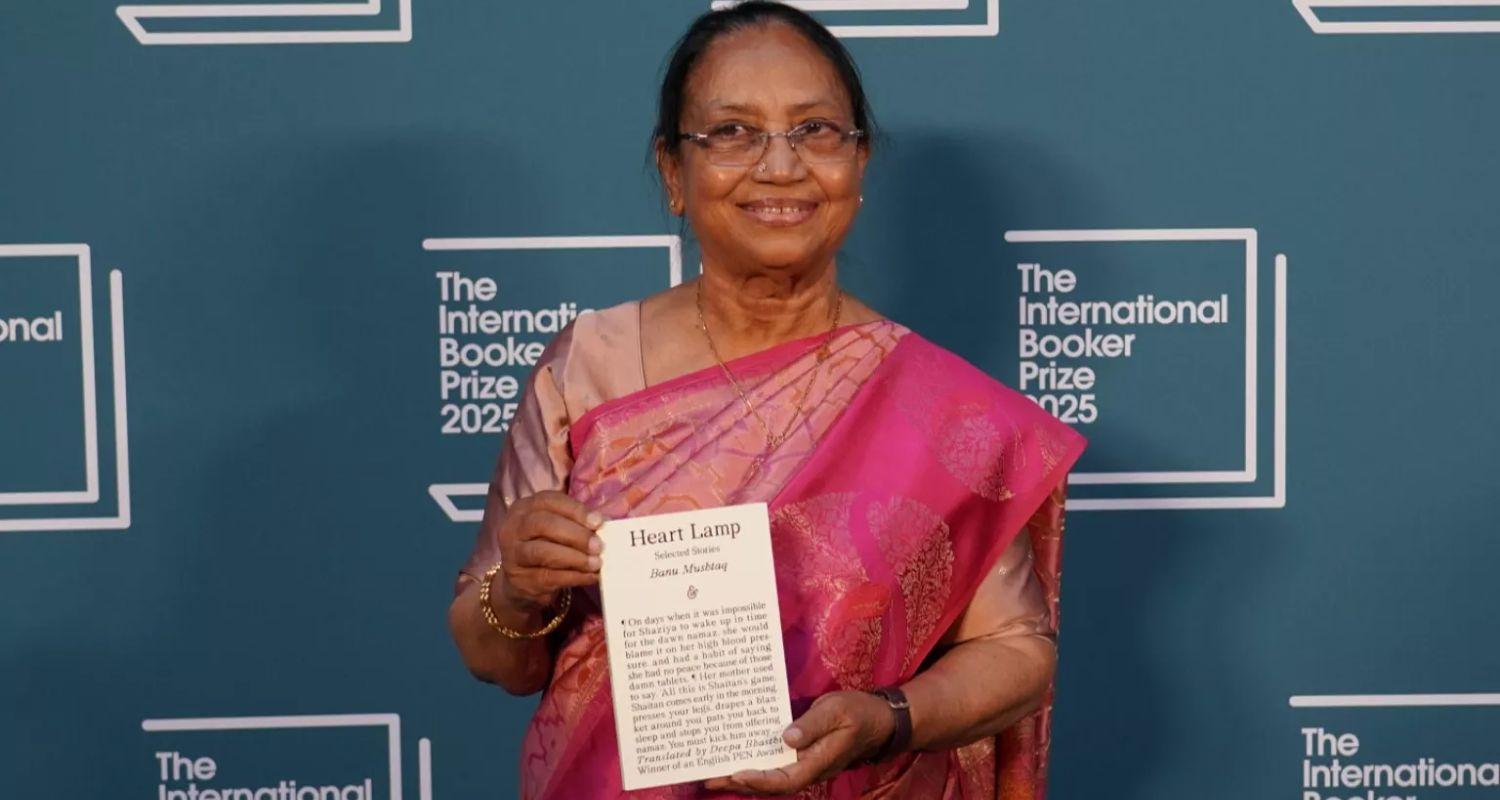Trending:
"Heart Lamp" shines light on India's rich literary tapestry
For those of us who have long lamented the lack of global recognition for India’s vibrant and diverse regional literature, the moment of celebration has finally arrived.News Arena Network - Chandigarh - UPDATED: May 24, 2025, 08:10 PM - 2 min read

'Heart Lamp' brings Kannada literature to global spotlight.
For those of us who have long lamented the lack of global recognition for India’s vibrant and diverse regional literature, the moment of celebration has finally arrived.
Banu Mushtaq’s Heart Lamp, a collection of twelve Kannada short stories, winning the 2025 International Booker Prize — the first ever for a Kannada work — marks a landmark victory for vernacular literature. It breaks through the systemic barriers that have kept regional writing from receiving its rightful place on the world stage.
There are countless such hidden gems across Indian languages awaiting discovery, translation, and celebration. The time has come for the global literary community to take notice.
Heart Lamp offers a poignant portrayal of the trials and tribulations faced by ordinary Muslim families in Karnataka, shining a spotlight on regional literature both figuratively and literally.
Mushtaq, a 77-year-old lawyer, journalist, and activist from a humble background in Hassan district, Karnataka, writes stories deeply rooted in the lived experiences of marginalised communities and oppressed women. Her characters confront caste discrimination, religious dogma, and patriarchal violence with quiet but defiant grace.
Written in a style that is simultaneously witty, vivid, and colloquial, her characters — the sparky children, audacious grandmothers, buffoonish maulvis, thug brothers, often hapless husbands, and above all, resilient mothers — reveal Mushtaq’s remarkable talent for observing human nature. She builds emotionally charged narratives from a rich oral tradition.
A Snapshot of Struggles
Spanning nearly three decades, these stories capture the raw edges of human nature with empathy and reveal the varied realities of contemporary women with rare artistry.
Rooted in the everyday lives of Muslim women and girls, the collection offers an intimate, deeply moving portrait of resilience, struggle, and the quiet strength it takes to exist, resist, and dream.
The translator, Deepa Bhasthi, deserves high praise for preserving the nuances of voice, context, and experience in her English rendition, allowing the essence of Kannada to shine through without compromise.
Bhasthi is the first Indian translator to win the prestigious prize, sharing the accolade with Mushtaq.
This Booker Prize win is a significant boost for Indian regional literature and the vital art of translation, opening doors for works in various Indian languages to reach a wider international readership.
Mushtaq follows in the footsteps of Geetanjali Shree, a Hindi writer who won the prize in 2022. While Tomb of Sand brought Hindi to global attention, Heart Lamp finally gives Kannada its rightful spotlight. This emerging trend promises broader recognition for India’s rich tapestry of regional languages.
Translations as Bridges
India’s vast reservoir of regional literature has often remained hidden due to a lack of robust translation ecosystems and international access.
Translation is the crucial bridge that can connect these stories to the wider world. Only through skilful, empathetic translations can global readers fully appreciate the beauty and power of India’s regional narratives.
Numerous extraordinary writers — past and present — in South Indian languages could have garnered international acclaim had their works been translated into English and introduced to global literary circles.
To name a few whose works have deeply influenced generations: Gudapati Venkata Chalam, Sri Sri, Gurazada Appa Rao, Rachakonda Vishwanatha Shastri, Beenadevi, Devulapalli Krishna Shastri (Telugu); Shivaram Karanth, U R Anantha Murthy, SL Byrappa, Kuvempu (Kannada); Jayakanthan, B Jeyamohan, Sujatha Rangarajan, Perumal Murugan, Ashok Mitran (Tamil); and MT Vasudevan Nair, Vaikom Muhammad Basheer, Thakazhi Sivasankara Pillai, OV Vijayan (Malayalam). These voices deserve their rightful place in world literature, attainable only through high-quality translations.
Voice of the Marginalised
Mushtaq’s own life story parallels the struggles portrayed in her work. Born into a modest family in a small Karnataka town, she began writing as a schoolgirl but only published much later, during a difficult period in her life.
After marriage, she endured confinement within her home and revealed in later interviews that she had once attempted suicide to escape her suffering. "Once, in a moment of despair, I poured kerosene over myself intending to set fire. Thankfully, my husband sensed it in time, hugged me, and took away the matchbox. He pleaded, placing our baby at my feet, saying, ‘Don’t abandon us’."
One of the stories in Heart Lamp reflects a similar episode. Her female characters consistently embody resistance and resilience.
Mushtaq later worked as a reporter for a local tabloid and was drawn to the ‘Bandaya’ (rebel) literary movement, which addressed social and economic injustices through literature and activism. After leaving journalism, she became a lawyer to support her family.
Her prolific career spans several decades, including six short story collections, an essay collection, and a novel.
Facing Threats
Her forthright challenge to tradition has made her a target. In 2000, after publicly supporting women’s right to pray in mosques, she received threatening calls and a fatwa was issued against her. A man attempted to attack her with a knife but was stopped by her husband.
Unbowed, Mushtaq continues to write with fierce honesty. "I have consistently challenged chauvinistic religious interpretations. These issues remain central to my writing. Society has evolved, but the core struggles of women and marginalised communities persist," she told the media.
Her stories reflect the ongoing challenges posed by religious conservatism and deeply patriarchal society. She has been honoured with several awards, including the Karnataka Sahitya Academy Award and the Daana Chintamani Attimabbe Award, recognising her profound contributions to Indian literature.
In 2024, an English collection of her earlier works, Haseena and Other Stories — selections from five collections published between 1990 and 2012 — won the PEN Translation Prize, further cementing her legacy.

